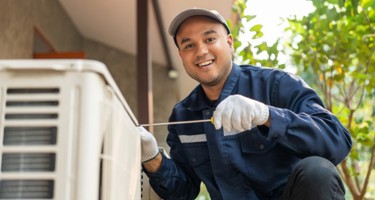
The short answer is there are multiple factors that impact your AC system's efficiency, such as its SEER rating, condition of your air ducts, and the temperature settings for your thermostat. By taking care of your air conditioner you will improve its efficiency.
We're all looking for ways to cut back on our energy costs. In fact, energy costs are rising across the United States. In some states, electricity rates have jumped up as much as 15 percent per month. The most effective air conditioners consume considerably less energy than the least efficient units, resulting in significant monthly savings.
There are several strategies to increase the efficiency of your air conditioner, from simple adjustments to make your home more comfortable to making a commitment to invest in a high-efficiency equipment when it's time for complete system replacement. All the answers you'll need to start living a more efficient, cooler, and comfortable life right away are available to you right now. Let's look at them each in depth.
SEER Rating
If you have heard of SEER but don't know what it means in relation to your air conditioning, SEER stands for Seasonal Energy Efficiency Ratio. The energy efficiency of an air conditioner when converting input energy into cooling performance is represented by this index.
Today, the current minimum SEER value with which a cooling system can be manufactured is 13; however, units are produced with values much higher than 13 as well, offering improved efficiency for every increase in rating. Checking the SEER value of air conditioning systems may be a crucial consideration when weighing the options of system replacement.
When purchasing a new air conditioner for your house, look for one with the best SEER value you can bare. Purchasing the most energy-efficient air conditioning system available today can help you enjoy energy savings over the HVAC system lifespan.
Temperature Set Point
The efficiency of your air conditioning is also influenced by the temperature set point programmed into your thermostat. Maintaining a significant temperature difference between your house and the outside world is taxing on your air conditioner, therefore for each degree of separation between the exterior temperature and the interior temperature, it must use more energy.
Setting your heating and cooling system at 76-78 degrees is a good compromise between warmth and efficiency. Avoid lowering your thermostat below 76 for lengthy periods of time, and never try to cool your home as quickly as possible by setting the thermostat too low. Doing this can deplete the efficiency of your air conditioner rapidly, resulting in higher costs for home cooling.
Setting the temperature lower while you are at home and raising it by one to two degrees when you depart allows your air conditioner a little rest for an efficiency boost without having to work too hard when you return home once more.
Air Duct Conditions
Coupled with lower humidity, these factors can make your ducts more susceptible to clogging and speeding up the buildup of dirt within them. If your ducts are filthy, blocked, or in poor repair, your air conditioning won't be able to properly distribute air and will lose efficacy. Aside from keeping an eye on your air conditioning maintenance, have your HVAC service check the condition of your ducts once a year.
Cleaning and patching air ducts is the most effective approach to ensure they function effectively, allowing you to get the most out of your air conditioner and increasing its overall cooling efficiency for better circulation and temperature control.
Poor Airflow
If your air conditioner isn't able to "breathe," your air handler will have to work harder, consuming a lot of power. Poor airflow can be caused by a clogged air filter, blocked condenser unit, or problems with your ductwork.
Make certain you continue to change your air filters, clear the area around your condenser unit, and have your system examined by a certified HVAC expert if your energy bills are unusually high to avoid airflow difficulties.
Dirty AC Coils
When dirt builds up on your condenser or evaporator coils, it stops them from effectively transferring heat. This makes it impossible for your air conditioner to remove heat from your house and result in an energy drain. Keep your coils clean by getting your engine's fluid changed every year (which includes a system cleaning) as well as keeping track of your air filter replacements.
Installing a higher-efficiency air filter will also aid to minimize dust build-up on your system. These special designed filters do a better job at keeping airflow open and often don't need changed on a regular basis, however are often more expensive.
Neglecting Annual Maintenance
Your air conditioner, like your automobile, needs regular care in order to run smoothly and effectively year after year. Small issues can become big ones if they are not addressed; the efficiency of your system may plummet dramatically. Make sure you plan your annual professional AC tune-up.
Trust ARS/Rescue Rooter To Keep Your AC Running
Do you want to conserve energy while also getting superior air conditioner performance? The air conditioning specialists at ARS/Rescue Rooter are professionally trained and perform countless maintenance services to homeowners across the United States each year.
Find your nearest ARS/Rescue Rooter location to request service or give us a call today!






